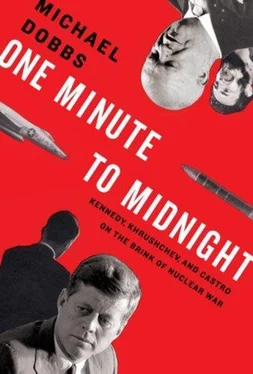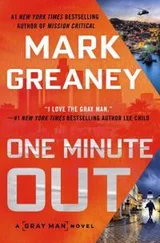It was an open question whether Soviet missiles in Cuba substantially changed the balance of power. The Joint Chiefs had emphasized the heightened risk to the United States of a sneak attack. But the president was inclined to agree with McNamara, who insisted that Khrushchev was still a very long way from achieving first-strike capability.
“Geography doesn’t make much difference,” Kennedy mused. What did it matter if you got blown up by a missile based on Cuba or an ICBM flying from the Soviet Union?
The real problem, he thought, was “psychological” and “political” rather than “military.” To do nothing would be to surrender to blackmail. In the Cold War game of nuclear brinkmanship, perception shaped reality. If Khrushchev got away with his gamble over Cuba, he would be encouraged to use similar tactics in Berlin, Southeast Asia, or any other Cold War trouble spot. Under attack by the Republicans for his passivity over Cuba, the president had issued a public statement on September 4 warning the Soviets that “the gravest issues would arise” if they developed a “significant offensive capability” in Cuba. He had planted a marker in the sand, and was now committed to defending it.
“Last month, I should have said we don’t care,” Kennedy said wistfully, as if to himself. “But when we said we’re not going to, and then they go ahead and do it, and then we do nothing…” His voice trailed off. Doing nothing was no longer an option.
From across the table, Bobby argued the case for an aggressive response to Moscow. The attorney general was more belligerent than he was articulate. If Khrushchev wanted war, it might be better to “get it over with… take our losses.” It would not be too difficult to find an excuse for invading Cuba. Bobby thought back to the Spanish-American War of 1898. The pretext for that war had been the destruction of an American battleship, the USS Maine, in Havana Harbor by a mysterious explosion. The United States had blamed the disaster on Spain as the colonial power, but true responsibility was never established.
Perhaps “there is some other way we can get involved in this,” Bobby ruminated. “You know, sink the Maine again or something….”
The discussion turned to the sabotage proposals against Cuba that had been considered by the Special Group earlier in the day. “I take it you are in favor of sabotage,” Bundy told the president briskly as he handed him the list.
The only item that raised a problem for Kennedy was the mining of Cuban harbors, an indiscriminate act of war that could result in the destruction of foreign flagships, in addition to Cuban and Soviet vessels. The following day, the White House sent a memo to the Mongoose team, formally recording the approval by “higher authority”—code word for the president—of the eight other sabotage targets, including the grenade attack on the Chinese Embassy.
WEDNESDAY, OCTOBER 17, AROUND NOON
Hurricane season was under way in the Caribbean. More than forty U.S. warships were headed toward the Puerto Rican island of Vieques for a practice invasion of Cuba. As the winds from Hurricane Ella topped 80 knots an hour, the approaching naval task force switched course to avoid the worst of the storm. Plans for an amphibious landing by four thousand Marines were put on hold.
Pentagon planners had dubbed the maneuvers “Operation ORTSAC,” Castro spelled backward. Once the task force got to Vieques, the Marines would storm ashore, depose an imaginary dictator, and secure the island for democracy. If all went well, the entire operation would last no more than two weeks.
The five Joint Chiefs had been pushing for an invasion of Cuba for many months. They were very skeptical of Operation Mongoose and saw “no prospect of early success” in fomenting an anti-Castro uprising inside Cuba. Back in April, they had warned the president that the “United States cannot tolerate permanent existence of a communist government in the Western Hemisphere.” If Castro was permitted to remain in power, other countries in Latin America might soon fall under Communist domination. Moscow might be tempted to “establish military bases in Cuba similar to U.S. installations” around the Soviet Union. The only sure method of overthrowing Castro was through direct “military intervention by the United States.”
Prior to the discovery of Soviet missiles on Cuba, the main problem confronting the Joint Chiefs was how to justify an attack against a much weaker nation. A memorandum dated August 8 outlined various ideas for a staged provocation that could be blamed on Castro, along the lines of the “Remember the Maine !” scenario that intrigued Bobby Kennedy:
• We could blow up a U.S. ship in Guantanamo Bay and blame Cuba;
• We could develop a Communist Cuban terror campaign in the Miami area, in other Florida cities, and even in Washington;
• A “Cuban-based, Castro-supported” filibuster could be simulated against a neighboring Caribbean nation.
• It is possible to arrange an incident that will demonstrate convincingly that a Cuban aircraft has attacked and shot down a chartered civilian airliner.
The Joint Chiefs were confident that they could organize an invasion of Cuba without running the risk of a “general war” with the Soviet Union. U.S. forces were strong enough to secure “rapid control” over the island, although “continued police action would be required.” A single infantry division, around fifteen thousand men, would be sufficient to occupy the island following the initial invasion.
The only dissent came from the Marine Corps, which challenged the assumption that Cuban resistance would be rapidly crushed. “Considering the size (44,206 sq. mi.) and population (6,743,000) of Cuba, its long history of political unrest, and its tradition of sustained and extensive guerrilla and terrorist resistance to constituted authority, the estimate that only a division-size force will be required subsequent to the assault phase appears modest,” a Marine Corps memo noted. It predicted that at least three infantry divisions would be required to subdue the island and that it would take “several years” to install a stable successor regime to Fidel Castro.
The Marine Corps had reason to be wary of Cuban entanglements. History had shown that it was a lot easier to send troops to Cuba than to pull them out. It had taken four years for the Marines to disentangle themselves from Cuba after the Spanish-American War. The Marines were back again four years later, much to the disgust of President Theodore Roosevelt, whose political career had received a huge boost in Cuba, when he led his Rough Riders up San Juan Hill. “I am so angry with that infernal little Cuban republic that I would like to wipe its people off the face of the earth,” the hero of 1898 grumbled to a friend. “All that we wanted of them was that they would behave themselves and be prosperous and happy so that we would not have to interfere.”
The Marines had remained in Cuba, off and on, until 1923, just three years before the birth of Fidel Castro. And even after that date, they still kept a foothold on the island, at Guantanamo.
From the American perspective, Cuba was a natural extension of the United States. The crocodile-shaped island was like a sluice gate bottling up the Gulf of Mexico, controlling the sea routes between the Mississippi River and the Atlantic Ocean. In 1823, Secretary of State John Quincy Adams attributed to Cuba “an importance in the sum of our national interests with which that of no other foreign Territory can be compared.” As Adams saw it, the annexation of Cuba by the United States was virtually inevitable, a function of the “laws of political gravitation.”
Just ninety miles from Key West, Cuba exercised a powerful pull over the American imagination, long after the withdrawal of the Marines. In the thirties, forties, and fifties, the island became a playground for rich Americans who flew in to lie in the sun, gamble, and visit whorehouses. American money poured into casinos and hotels in Havana, sugar plantations in Oriente, and copper mines in Pinar del Rio. By the 1950s, much of the Cuban economy, including 90 percent of the mining industry and 80 percent of utilities, was under the control of American corporations.
Читать дальше












